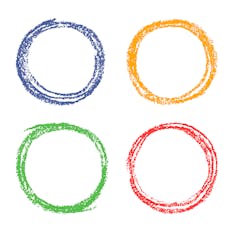Children can't always read between the lines. Sometimes it's better to be explicit
- Written by Lyn Tieu, Senior Research Fellow, Western Sydney University
When we communicate, there is often just as much meaning in what we don’t say as in what we say overtly.
For example, if I say “Sally coloured the circle or the triangle”, you will probably take this to mean she coloured only one of them, not both, even though I didn’t say so explicitly.
In linguistics, we call this implied not both meaning a “scalar implicature”.
Scalar implicatures have some interesting properties. In particular, they show up with certain positive sentences, but disappear when those sentences are made negative.
For example, “Sally coloured the circle or the triangle” implies she coloured only one and not both. Compare this to the negative version: “Sally didn’t colour the circle or the triangle.” This usually means she failed to colour both shapes.
Scalar implicature meanings seem to be difficult for children to get, even as late as nine years of age. For example, children don’t seem to get the not both meaning of the positive “or” sentence.
Instead, for them, “Sally coloured the circle or the triangle” can mean she coloured one or both shapes.
 Did Sally colour one circle or a few? It matters how you say it.
Shutterstock
Did Sally colour one circle or a few? It matters how you say it.
Shutterstock
On the other hand, children don’t have any issues understanding the negative versions of such sentences. When presented with the negative “or” sentence (“Sally didn’t colour the circle or the triangle”), they get the neither interpretation, just like English-speaking adults do.
Other examples of hidden meaning
The not both meaning of “or” is just one example of a scalar implicature.
Linguists have recently studied sentences that contain plural nouns, like “circles”. The sentence “Sally coloured circles” usually means she coloured more than one circle.
According to some theories, this more than one meaning is also a scalar implicature. That’s because it shows up in positive sentences, and disappears when the sentences are negated.
The negative sentence, “Sally didn’t colour circles” means she didn’t colour any circles. It doesn’t imply she coloured one but not more than one circle.
One common way linguists study how children understand sentences is through a “truth value judgement task”. Here, the experimenter presents the child with a scenario, and asks them to judge whether a particular sentence can describe that scenario.
Whether the participant says “yes” or “no” tells us how they interpret the sentence.
In our latest experiments, we wanted to know how children interpret sentences with plural nouns. In two separate experiments, four– and five-year-old children listened to short stories told through cartoon images.
At the end of each story, a puppet, who had listened to the stories too, described what had happened in the cartoon.
For example, after seeing a little girl colour one of two circles in her colouring book, the puppet might say: “I know what happened! Sally coloured circles!”
 Researchers used a puppet to communicate with children.
Shutterstock
Researchers used a puppet to communicate with children.
Shutterstock
Children would then be asked to judge whether the puppet was right. If they said “yes”, this would tell us they found the sentence with the plural noun “circles” an acceptable description of what had happened in the story.
Because only one circle was coloured, this would mean for these children, a plural could mean just one and not necessarily more than one.
This is what we observed. While adults rejected the use of positive plural sentences to describe singular contexts (they didn’t think “Sally coloured circles” meant she coloured just one), children tended to agree with the puppet in these cases.
Read more: 8 tips on what to tell your kids about coronavirus
And we know the children weren’t simply saying “yes” to anything the puppet said. When Sally coloured one circle, children rejected the negative sentence “Sally didn’t colour circles”, just like adults did.
In other words, as with “or”, children interpret plurals like adults do in negative sentences, but not in positive ones.
Such data help us better understand how language works. In this case, similarities between plurals and other implicatures support the theory that plural meanings are just another kind of scalar implicature.
Why it’s better to be explicit
Adults communicate quite a bit of hidden meaning, expecting our conversational partners to read between the lines. But experiments like ours show conversational partners, particularly children, may not always interpret what we say the way we intend it.
In some cases, it might be worth making explicit what we mean. As a parent, if it matters our child choose only one of two toys, it might be better to say explicitly: “Choose only one of these toys. Either the red or blue one, but not both.”
Likewise, if we’d like them to read more than one book, we might want to say, “Let’s read all three of these books” explicitly, rather than leaving the child to infer it.
Authors: Lyn Tieu, Senior Research Fellow, Western Sydney University





